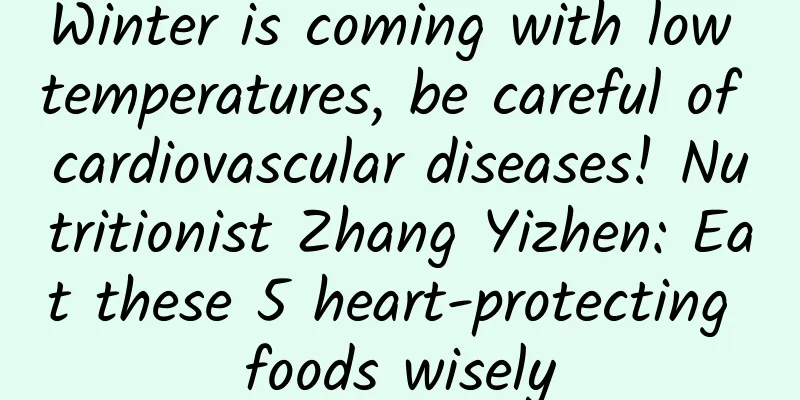Winter is coming with low temperatures, be careful of cardiovascular diseases! Nutritionist Zhang Yizhen: Eat these 5 heart-protecting foods wisely

|
The winter solstice (December 22) is coming soon. After the winter solstice, the temperature will continue to drop because the heat radiated by the sun to the ground is less than the heat dissipated by the surface. The real cold will occur in the last two solar terms of winter, "Xiaohan" and "Dahan". Winter is a season when low temperatures and large temperature differences arrive, making it a high-risk season for cardiovascular diseases and cerebral strokes! The low temperature in winter can directly cause blood vessel constriction, resulting in increased blood pressure, and high blood pressure is a major risk factor for cerebral hemorrhage. Therefore, winter is the key to protecting cardiovascular health. Nutritionist Zhang Yizhen teaches everyone how to eat five heart-protecting foods wisely to prevent cardiovascular diseases. Nutritionist Zhang Yizhen reminds you that in low temperatures, in addition to being careful about catching a cold, you must also be careful about cardiovascular diseases! Nutritionist Zhang Yizhen said that it is recommended to eat five heart-protecting foods in winter to stay away from the threat of cardiovascular diseases. 5 must-eat foods to protect your heart1. Fruits and vegetables Fruits and vegetables are rich in folic acid, potassium, fiber and flavonoids. Studies have found that eating more fruits and vegetables can reduce the risk of cardiovascular disease. It is recommended to eat at least five fruits and vegetables every day. 2. Whole grains and unrefined grains Compared with unrefined starch, whole grain ingredients contain more micronutrients such as fiber, B vitamins and minerals. In addition, eating whole grains and unrefined grains can make you feel fuller, and blood sugar fluctuations are more stable, with a lower risk of cardiovascular disease. It is recommended to replace refined starch with unrefined grains. 3. Seafood Fish is rich in Omega-3 fatty acids, which can reduce inflammation in the body. Replacing red meat with fish and seafood reduces the intake of saturated fat. It is recommended to consume 15 grams of fish per day or eat fish more than twice a week for cardiovascular benefits. 4. Nuts and Beans Nuts and beans are rich in unsaturated fatty acids, vitamin E and fiber. Studies have found that increased intake of nuts and beans is associated with a reduced risk of stroke and cardiovascular disease. 5. Tea Tea contains flavonoids such as catechins, which have a protective effect on the cardiovascular system. Nuts and beans are rich in unsaturated fatty acids, vitamin E and fiber. Studies have found that increased intake of nuts and beans is associated with a reduced risk of stroke and cardiovascular disease. In addition to the five must-eat foods to protect your heart, you should also be aware of some undesirable foods that you should avoid: To protect your heart, eat less landmine foods1. Processed meat Processed meat includes smoked and pickled meat and seafood, such as sausages and bacon, which usually contain more salt, saturated fatty acids, heterocyclic amines and other harmful substances after grilling, which have been proven to increase the risk of cardiovascular disease. 2. Sugary drinks and sweets Sugary drinks such as hand-shaken drinks, sports drinks and many sweets contain added sugars such as sucrose and corn syrup, which can easily cause obesity and increase the risk of cardiovascular and diabetes. 3. High-sodium foods Proper seasoning of food can make it more delicious, but too much salt can easily raise blood pressure and increase the risk of cardiovascular disease. It is recommended to use natural spices such as garlic, onion and pepper instead of seasonings such as soy sauce. 4. Trans fats and high-fat diets Trans fats are often found in pastries with puff pastries, potato chips, and fried foods. It is recommended to eat less of these foods and reduce excessive fat intake, which will help reduce the risk of cardiovascular disease. Other daily heart care tips1. Exercise more Regular exercise helps blood circulation. It is recommended to exercise for more than 150 minutes a week to help the body consume calories and improve metabolism. 2. Multi-body control Go to the hospital for regular physical examinations every year and always pay attention to your weight. Being underweight or overweight/obese is not good for cardiovascular risks. It is recommended to maintain a healthy body position (BMI 18.5-24). 3. Smoke less Smoking not only harms your lungs but also your heart. If you want to maintain good health, it is better to quit smoking. 4. Drink less alcohol Nutritionist Zhang Yizhen said that there has always been controversy about the relationship between drinking and cardiovascular disease. Studies have found that drinking 1-2 glasses of wine a day has the lowest risk of cardiovascular disease, but due to differences in local eating habits and other possible influencing factors, the American Heart Association (AHA) recommended in 2021 that if you don’t have a drinking habit, it is recommended not to start. If you do drink, it is recommended that women do not drink more than 1 glass a day and men do not drink more than 2 glasses a day. 👉Recommended reading: Red fruits and vegetables have strong antioxidant properties and protect the cardiovascular system! Nutritionist Liu Yili: 4 red foods you must eat 👉Recommended reading: Stay away from cardiovascular diseases, not only prevent high bad cholesterol! Doctors remind: Three good and three avoid to improve the quantity and quality of bad cholesterol VIP Selected Products Latest health knowledge |
Recommend
Say goodbye to belly fat~ Clothesline exercise to strengthen waist and abdomen
Feel like you'll never lose weight? You keep ...
Can a gum cyst cause an ovarian cyst?
Can a gum cyst cause an ovarian cyst? Gingival cy...
Pelvic inflammatory disease care is very important in life
The treatment of pelvic inflammatory disease must...
How to cure ovarian cysts
How to cure ovarian cysts? Many patients do not k...
How to treat functional uterine bleeding
Functional uterine bleeding requires a suitable t...
What to do with hyperprolactinemia in early pregnancy
Some women have high prolactin levels after pregn...
Precautions before and after physical treatment of cervical erosion
Cervical erosion is not a disease, but a symptom ...
What are the grades of uterine prolapse?
What are the grades of uterine prolapse? Medicall...
What is the situation when the leucorrhea increases and has a strange smell? It needs to be confirmed
For women who have increased vaginal discharge an...
How to control appetite when losing weight? Is starch the enemy of weight loss? 9 great weight loss diet tips to get rid of your gluttony addiction
With all kinds of delicious food around, it is al...
Is it true that patients with uterine fibroids cannot eat longan meat?
Patients with uterine fibroids can eat longan pul...
Understanding what is threatened miscarriage
If you don't take care of your body when you ...
Why did my period come again in less than 10 days?
Why did my period come again in less than 10 days...
Luffa helps lose weight! Nutritionist teaches 2 recipes for losing weight
The juicy and refreshing loofah is suitable for s...
What symptoms does dysmenorrhea cause?
The term dysmenorrhea must be familiar to most wo...









